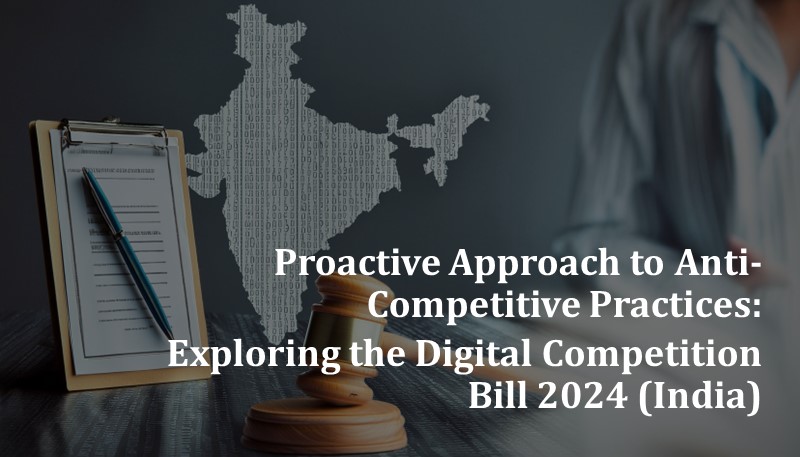Have you ever wondered why large technology companies are often fined huge sums of money in the European Union or the US? Most of it boils down to digital competition. And if the Indian government’s plan to implement the Digital Competition Bill (2024) in India takes shape, this might become a reality here as well. Before we go any further, it will be important to understand what digital competition is and how it differs from other forms of competition.
Digital competition refers to the competitive dynamics within the digital markets, encompassing everything from social media platforms and search engines to e-commerce giants and streaming services. Unlike traditional markets, digital competition involves unique challenges such as network effects, data monopolies, and algorithm-driven decision-making. These aspects can create barriers to entry, limit consumer choice, and stifle innovation, prompting regulators worldwide to step in.
In recent years, global regulatory bodies have ramped up efforts to address these challenges. The European Union’s Digital Markets Act and the United States’ ongoing antitrust cases against major tech companies are prime examples. These regulations aim to curb monopolistic practices, ensure fair competition, and protect consumer interests. Now, India is poised to join this league with its own digital competition bill.
The proposed Indian digital competition bill aims to tackle the dominance of big tech companies, promoting a level playing field for smaller players and startups. This move is not just about imposing fines or penalties but about creating an ecosystem where innovation thrives, and consumers benefit from greater choices and better services. The bill is expected to address issues like data privacy, algorithmic transparency, and anti-competitive practices, making it a comprehensive approach to regulating the digital economy.
As India gears up to introduce this landmark legislation, it raises several questions. How will it impact the tech giants operating in the country? What will it mean for startups and smaller businesses? And most importantly, how will it protect the interests of consumers while fostering innovation? These are the critical aspects we need to explore to understand the full scope and potential impact of India’s digital competition bill.
Who does the Digital Competition Bill 2024 (India) apply to?
The Bill primarily applies to “Systemically Significant Digital Enterprises” (SSDEs)[1] and their “Associate Digital Enterprises” (ADEs)[2].
Key responsibilities of an SSDE:
The Bill imposes a series of obligations on SSDEs and ADEs (these are the tech giants) to ensure fair competition and transparency. It also proposes to take pre-emptive steps to nip anti-competitive practices in the bud and prevent the impact of such practices from escalating. Upon being designated as such, SSDEs and ADEs are entrusted with following added compliance requirements:
- Prohibit favouritism of their own products, services, or lines of business and favouring related parties’ or third parties’ products, services, or lines of business.
- Non-public data of business users should not be used to compete against them on their Core Digital Services.
- End users or business users should not be restricted from downloading, installing, operating, or using third-party applications or software.
- Business users or end users should not be incentivised or required to use one or more of the SSDE’s products or services unless such use is an integral part of the Core Digital Service.
- Setting up a robust complaint redressal mechanism.
Probable penalties – There now lies a possibility of facing substantial penalties for non-compliance. The penalties can be as high as – up to 10% of the global turnover of the SSDE and can include fine up to INR 25 crore or even imprisonment for up to three years based on the severity of the non- compliance.
Impact of the Digital Competition Bill (2024) on Smaller Companies and Consumers:
The Bill is meant to protect start-ups and small businesses from the anti-competitive practices of the tech giants thereby encouraging innovation. It also provides them with the confidence to monetise such innovation. However, the curb on data sharing may impact some of these businesses, which rely on data from bigger platforms to reach out to a bigger audience.
Conclusion:
The Digital Competition Bill 2024 represents a proactive shift towards addressing anti-competitive practices in the digital marketplace. By targeting SSDEs and imposing stringent obligations, the bill aims to foster fair competition and transparency. As regulatory frameworks continue to evolve to meet the demands of the digital age, it is crucial to strike a balance between fostering innovation and safeguarding against anti-competitive behaviour, thereby creating a thriving and equitable digital economy for all stakeholders.
[1] An enterprise is considered a Systemically Significant Digital Enterprise (SSDE) in respect of a Core Digital Service if it meets a certain financial and user threshold over the last three financial years. Financially, the enterprise must have substantial turnover, high gross merchandise value, or a considerable market capitalisation. In terms of users, the enterprise must additionally have a large number of end users or business users in India. Both financial and user criteria must be met consistently over the specified period.
[2] Associate Digital Enterprises (ADEs) are enterprises within the same group as an SSDE that are involved in the provision of core digital services. Once an enterprise is designated as an SSDE, its related entities may also be designated as ADEs, thereby bringing them under the same regulatory obligations.
Written by: Sanchita Agarwal, Mohit Dujari
Co-authored by: Soham Thakur
Disclaimer
This content is intended for informational purposes only and does not constitute a legal opinion. Despite our efforts to maintain accuracy, we do not make representations, warranties or undertakings regarding the quality, completeness or reliability of the content. Readers are encouraged to seek legal counsel prior to acting upon any of the information provided herein. This content, including the design, text, graphics, their selection and arrangement, is Copyright 2024, Lexplosion Solutions Private Limited or its licensors. ALL RIGHTS RESERVED, and all moral rights are asserted and reserved.
For any clarifications, please reach out to us at 91-33-40618083 or inquiries@lexplosion.in. Refer to our privacy policy by clicking here.





